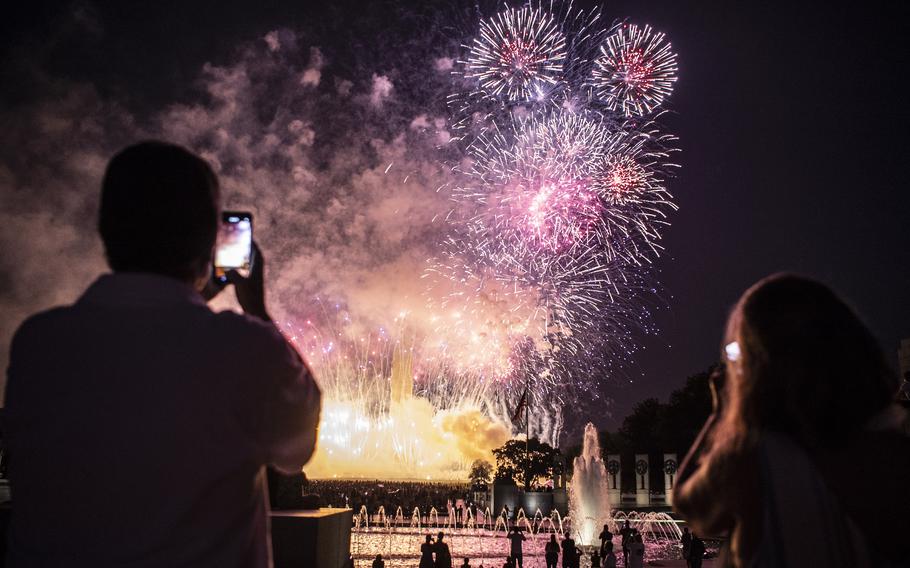
Spectators view the Independence Day fireworks display at the World War II Memorial in Washington, D.C. on July 4, 2020. (Carlos Bongioanni/Stars and Stripes)
(Tribune News Service) — Illegal fireworks not only affect children, pets and people with breathing problems, but also combat veterans with post-traumatic stress disorder like Will Brown, who served as a Navy corpsman in Vietnam.
Brown, 82, was sleeping in his 15th-floor rental apartment in Moiliili on a fall 2022 night when he was jolted awake “screaming and shrieking “ in response to a “huge bang “ from an illegal aerial firework that immediately took him back to Kien Giang province in Vietnam.
“When this happens, I am ‘bam, ‘ right directly back to being in a battlefield in Vietnam, “ Brown said. “And that is so horrifically painful and terrifying to me. When I left Vietnam I thought I was leaving it behind. I’ve carried it with me for 56 years now.”
Nearly two dozen bills have been introduced this legislative session at the state Capitol calling for creation of law enforcement task forces, increased fines and a boost in inspections for shipping containers. Most of the proposals refer to the effects of firework-related injuries as well as how the explosions affect pets, children and adults with breathing issues. But they don’t mention the effects on veterans who suffer from PTSD.
Retired Hawaii Army National Guard Maj. Chris topher Slavens, 55, of Diamond Head used to work in the Department of Veterans Affairs helping veterans adjust to civilian life. “Typically, fireworks are on top of everything else that veterans are trying to adjust to, “ Slavens said. “And that sense of not being understood can be amplified, “ he said, adding that veterans in need of medical care can access it through VA without being registered.
Three VA doctors wrote in an email statement to the Honolulu Star-Advertiser that veterans with PTSD can receive “effective mental health treatment in any of our general mental health clinics “ at Spark M. Matsu naga Medical Center and community-based outpatient clinics on neighboring islands as well as on Guam and Saipan and in American Samoa. The VA Pacific Islands Health Care System has specialty clinics that provide treatments for veterans with PTSD, including prolonged exposure, cognitive processing therapy and eye movement desensitization and reprocessing therapy.
Ray Aivazian, who served as a combat engineer in Afghanistan for the Marines, said fireworks don’t bother him as intensely as they do some other vets.
Aivazian, 33, said that during his military service he spent time near plenty of explosives and gunfire, which accustomed him to loud noises. “Because I was around those sounds, I know the difference between a gunshot and a firework or a car backfiring, “ Aivazian said.
The Kaneohe resident is fine during major fireworks holidays, but random fireworks explosions can still startle him. “It doesn’t affect me the same way it does others, “ Aivazian said. “And that’s the interesting thing about PTSD, is how it’s a case-by-case basis.”
Retired Army Sgt. Patrick S. Malone, 40, said that he too is not alarmed by pre-planned fireworks. Rather, he looks forward to them. Still, the former combat medic, like others, is sometimes caught off guard when fireworks explode unexpectedly.
“There was some the other day—somebody just let off right outside my house (in Aiea ) like a chain of fireworks, “ Malone said. “I wasn’t ready for it.”
Also, Malone said he avoids being near the Hilton Hawaiian Village on Friday nights because of the weekly fireworks show. “If I’m close, it’s like I’m hanging mortar rounds downrange again, “ he said.
Malone’s service spanned 10 years, including deployment to Diyala province in Iraq from 2010 to 2011.
Retired Army Col. Debra M. Lewis, 65, of Hilo had a bad experience with fireworks at a Fourth of July event in the early 1970s at what was then called Wolf Trap Farm in Virginia. The fireworks went off course and into the crowd. “I think I have more PTSD from that, even though I’d been in combat, “ Lewis said.
Lewis served for 34 years and was commander of a $2.1 billion construction program for Baghdad and Anbar province in Iraq from June 2006 to July 2007.
She pointed out that fireworks can trigger other combat veterans in civilian life to “just drop to the ground—because that’s what you do “ in a combat situation.
Brown, the Vietnam Navy corpsman, went on to become a doctor and served as a physician with the military provincial health assistance program. He retired as a lieutenant and became a pediatrician in civilian life.
Calling himself “the biggest kid on the block, “ Brown said he loves fireworks that are “anticipated and predicted.” However, “when it is unexpected—illegal fireworks that are not anticipated—that’s what gets us (veterans ).”
As a result, Brown said he’s been suicidal three times. He said the suicide rate among vets is double the general population—and maintains that fireworks contribute to that spike. “It’s why I speak up about it, “ Brown said.
When Brown shares his concerns about fireworks with others, the response is often “I would have never, ever thought of that, “ Brown said, adding, “And yet there are 100, 000 combat veterans—men and women living in Hawaii—who could potentially be affected by this.”
(c)2023 The Honolulu Star-Advertiser
Visit The Honolulu Star-Advertiser at www.staradvertiser.com
Distributed by Tribune Content Agency, LLC.